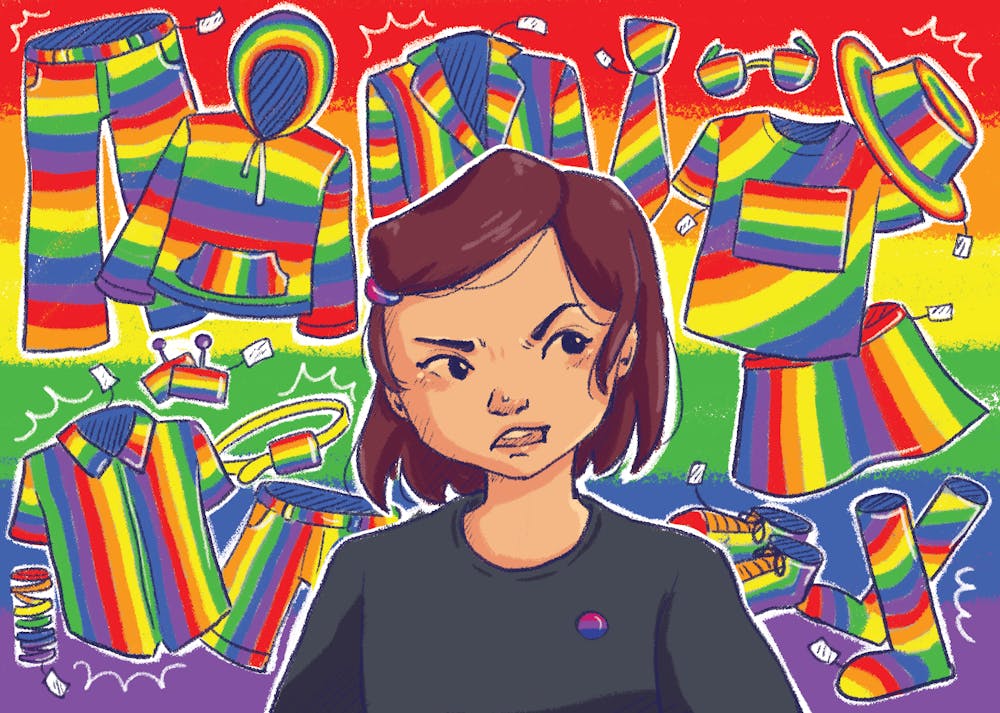On June 1, major corporations and companies changed their profile pictures and Twitter banners to display rainbows in solidarity with the LGBTQ+ community during Pride Month, and rainbow-branded products took center stage.
Seeing these displays left queer people feeling skeptical, especially knowing the companies' presence is temporary and expired July 1.
"When I was younger, I thought it was awesome. I remember being like, ‘Oh my god, I can buy these rainbow suspenders,'" said Zarella Vasquez, a graduate student studying elementary education. "It was exciting at first, but then, slowly, I started realizing the people that are doing this aren’t the people that should be benefiting from it."
Hannah Mason, a sophomore studying nonprofit leadership and management and communication, identifies as queer. They’ve found that today’s execution of Pride, perpetuated by corporations and rainbow-washing, leans more toward idealism in the form of celebration rather than furthering the movement. The one-note designs and the lack of queer people making decisions at the corporate level make Pride merchandise disingenuous and monotonous.
"I think it really shows their insistence on inclusivity as just on a surface level," Mason said. "They're not actually employing people at the community to help design these things. It's about straight people being like, 'Oh, yeah, gay people wear it.' So I think it's really trying to put gay people in a box. Just because the merch is all the same, it's all just rainbow blazers."
Vasquez, who identifies as bisexual, worked on the sales floor at Target as a freshman. While she would have liked to see her employers getting staff excited about Pride Month or fostering education among staff, employers instead encouraged floor members to make sure the rainbow merchandise was stocked, on display and visible with little discourse.
The experience left a lasting impression on Vasquez, even outside of the workplace as a consumer.
"It kind of took away the excitement from it. I'm not a huge fan of it, it makes me feel a little uncomfortable," Vasquez said. "And I don't see Pride ... it just proves to me how much more we have to work toward equality."
Cailan Cordwell, a master’s student studying social justice and human rights, expressed distaste for the transient presence of rainbows during June, stemming from the same discomfort as Vasquez.
"It feels like my identity is being commodified," said Cordwell, who identifies as lesbian. "The symbols of our identities are no longer ours; they are being used and entrenched in the capitalist nature of the United States."
One of the big reasons for this skepticism from informed consumers comes from the continuous need to evaluate a company's promises. To Cordwell, substantive support is continuous support.
"If you don't donate to LGBT (organizations) and continue to support your LGBT community and customers throughout the year, then I don't want it for just a month," Cordwell said. "Because then it feels like you're just doing it very intentionally as like a costume, as a temporary thing."
To Mason, structural change in the way corporations value diversity would make corporate Pride Month efforts impactful.
"Until queer people start to get accepted more in the area of corporation, at the end of the day, queer people often go into the nonprofit sector and arts," Mason said. "It’s very stereotypical but it's also true, a lot of queer people tend to go towards more accepting communities and hardcore business just isn't one of those."
As corporate environments become more inclusive for queer people in both workplace culture and financial support, acceptance has begun to progress. According to an annual report from the Human Rights Campaign, 233 Fortune 500 businesses received a perfect score in the Corporate Equality Index; this number has grown from 214 in 2020.
As a consumer, LEGO has had an impactful experience on Cordwell and her family. Recently, she was gifted a LEGO set designed by queer artist Matthew Ashton, with attention to detail and good visual representation in the figurines. Ashton took the most recent Progress Pride flag as inspiration for the design, with a hairstyle on one of the icons reminiscent of 1980’s drag iconography. It’s little details like these combined with substantive financial support that makes a difference for consumers like Cordwell.
"They didn't have to make those choices, they could have done a very basic flag with none of those decisions, and people still would have bought it," Caldwell said. "They know that. But it feels almost like a step toward progress."
Mason and Cordwell hope that corporations can evolve in a way that moves away from performance to genuine support, but holding out hope for a "fake-it-till-you-make-it" situation is difficult. Skepticism prevails nonetheless. Cordwell recommends supporting queer-owned small businesses on sites like Etsy instead.
“At the end of the day real Pride isn’t coming from corporations, real Pride comes from the community itself,” Mason said. “Although I do love the representation, I just wish that it would be more present.”
Reach the reporter at ssheptun@asu.edu and follow @SheptunovSonya on Twitter.
Like The State Press on Facebook and follow @statepress on Twitter.
Continue supporting student journalism and donate to The State Press today.

Sonya Sheptunov is a podcast producer at The State Press. They take an interest in data, counterculture, and all things nerdy. In their free time you can find them drinking too much coffee or attempting to crochet.




